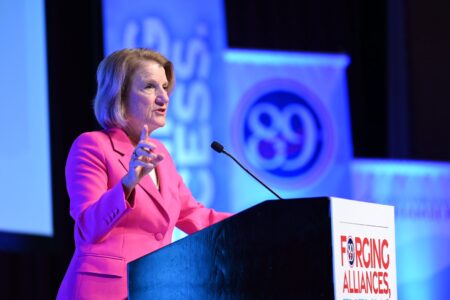Capito: Federal Broadband Funding Will Soon Start Going Out to States

photo by: W.Va. Chamber of Commerce
U.S. Sen. Shelley Moore Capito tells attendees of the West Virginia Chamber of Commerce’s Annual Meeting and Business Summit Thursday that delays in awarding federal broadband dollars will soon be over.
CHARLESTON — When U.S. Sen. Shelley Moore Capito, R-W.Va., fought to include billions in funding in the 2021 bipartisan infrastructure bill for nationwide broadband expansion, she had no idea five years later that zero dollars would be spent. But finally, there is light at the end of the tunnel.
West Virginia is poised, again, to be one of the first handful of states to submit its final proposal for the U.S. Department of Commerce’s National Telecommunications and Information Administration for the federal Broadband Equity, Access and Deployment program.
The public comment window for West Virginia’s BEAD proposal closed last week, with the final proposal being sent to the NTIA by Thursday, Sept. 4. That will trigger a 90-day comment period at the federal level before the NTIA can approve or recommend changes to the proposal.
The BEAD Program, established by the Infrastructure Investment and Jobs Act (IIJA) with Capito heavily involved in the negotiations with former president Joe Biden, allocated more than $42 billion to expand high-speed broadband access across the United States. West Virginia was awarded $1.2 billion by the NTIA in 2023.
West Virginia was one of three states ahead in the BEAD application process and prepared to send its final proposal back in April. But Gov. Patrick Morrisey announced in March that West Virginia was granted a 90-day extension to submit the state’s final BEAD grant proposal.
The BEAD program was placed on a pause at the beginning of March by Commerce Secretary Howard Lutnick while the program was being reviewed. The program was accused of favoring some technologies over others, being bogged down by cumbersome regulations and red tape, and being high in cost.
Capito placed the bulk of the blame for the slowdown of the BEAD program on the Biden administration, which she said allowed red tape to keep the program from quickly pushing out broadband and the change in administration once President Donald Trump took office for a second term.
“We’re looking at almost four to five years,” Capito said by phone Friday. “This money has been promised, this $1.2 billion investment into West Virginia, and not a dollar has flowed.
“You want to talk about bureaucracy and regulation and morass? We were right at the edge of being able to get our money when the changeover in the administrations occurred,” Capito told attendees Thursday at the West Virginia Chamber of Commerce 89ths Annual Meeting and Business Summit at the Greenbrier Resort in White Sulphur Springs. “They decided to put a hold, like they put a hold on a lot of things…So now, the new deadline is September.”
According to the state’s BEAD draft final proposal, the West Virginia Office of Broadband within the state Department of Commerce will award $625 million of the $1.2 billion BEAD grant to nine provisional subgrantees to expand high-speed broadband to nearly 74,000 locations across the state.
According to reporting by Mountain State Spotlight, the number of locations was reduced between the state’s earlier BEAD proposal and the updated BEAD proposal, from 114,000 locations to the 74,000 number due to a reclassification of locations. The funding is meant to expand broadband access to unserved and underserved locations across the state.
If the state’s BEAD proposal is approved, the majority of the $625 million would go to Bridgeport-based Citynet ($229.2 million), Frontier Communications ($209.3 million), and Comcast ($61.3 million). The remainder of the funding would be divided between smaller regional internet service providers: Micrologic, GigaBeam, Prodigi Internet, Armstrong, and Hardy Telecommunications. The smallest award – $6.4 million – will go to Elon Musk’s Starlink, a low earth orbit (LEO) satellite internet service provider.
“West Virginia’s lagged in terms of broadband Internet for too long,” Morrisey told Business Summit attendees Thursday. “The good news is, thanks to a lot of the work, the people that came before me, and our federal representatives, the State of West Virginia is now in the final stages of its BEAD application…That has the ability to be a true gamechanger in the Mountain State.”
During an afternoon break last Thursday during the Chamber’s Business Summit, Capito was joined by NTIA Administrator Arielle Roth for a closed-door roundtable with offices with the state Office of Broadband, members of the Broadband Enhancement Council, lawmakers, and representatives of ISPs and utilities.
“After years of delays by the Biden administration, NTIA is proud to be moving forward on the BEAD program and delivering the ‘Benefit of the Bargain’ for Americans,” Roth said in a statement Thursday. “It was an honor to join Senator Capito and local stakeholders to discuss the next stage of the program and NTIA’s commitment to closing connectivity gaps in West Virginia once and for all.”
“We were face-to-face making the case very strongly that we’re backing up the (BEAD) application,” Capito said. “Administrator Roth, on her first official visit for the BEAD program, came to West Virginia to hear our concerns. We’re very excited about that and so, we’re looking forward to having those 74,000 locations served as quickly as possible once we get this application and proposal approved.”
Broadband expansion has been a priority for Capito both as a former congresswoman and after becoming a U.S. Senator in 2015, creating the Capito Connect program. Capito Connect is aimed at educating the public about the benefits of broadband access for homes and businesses, the need for public-private partnerships and expanding broadband, and the need for creative solutions to bring broadband to a state known for its mountainous terrain and hollers.
Capito has been a proponent of fiber broadband for its reliability. But changes in the BEAD program under the Trump administration favor LEO services, such as Starlink. But Capito said the variety of companies that will receive BEAD money in the state, including Starlink, will provide options for West Virginians depending on their locations.
“I think if you combine satellite, the large players, but also the GigaBeams and the Micrologics and others, we need them all,” Capito said. “Everybody’s pretty much on the same page. They’re not knocking heads competing with one another. They’re just trying to get to the same goal of completion of broadband delivery.”
As the fourth ranking member of Senate Republican majority leadership and chairwoman of the Senate Environment and Public Works Committee, Capito is hoping to use her influence to push through an energy and infrastructure permitting reform package through Congress before the end of the year. Part of that would involve removing red tape to allow fiber to be installed along with future infrastructure projects.
“Whether it’s energy development, whether it’s housing, whether it’s transportation, whether it’s water systems…the timelines, the expense, the repetitiveness, the bureaucratic red tape that exists right now prevents projects for moving forward,” Capito said. “For the broadband area, this is really, really important.
“There’s right-of-way issues,” Capito explained. “There are some (issues) where we already have the right-of-way, and if you’re just going to lay fiber where there’s already a highway, why do we have to jump through all the hoops? So, permitting reform is really something that we’re working on every day very diligently. It has to be bipartisan and it has to be reasonable, but it will help these broadband projects for sure.”





